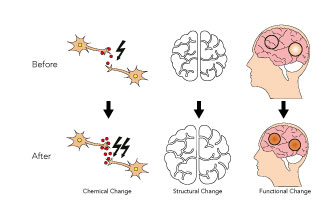
Neuro-Optometric Rehabilitation — FAQs
Frequently Asked Questions with Dr. Sophie Jobin
Q: What is Neuro-Optometry?
- A: Neuro-optometric rehabilitation is a customized treatment regimen for people with visual deficits resulting from traumatic brain injuries (TBI), physical disabilities or other neurological conditions, such as a stroke, Parkinson’s disease or multiple sclerosis. It addresses problems related to eye teaming, tracking, and focusing that can make it difficult to read and complete tasks.
Q: How Does Neuro-Optometry Help?
- A: Neuro-optometric rehabilitation helps patients recover their vision by performing therapeutic activities specifically designed to retrain the neural processes of the brain. By using specific eye-training exercises, one can rewire the brain (neuroplasticity) and thus improve eye function. Treatments typically include specialized glasses and/or in-office and at-home neuro-rehabilitation exercises aimed at diminishing symptoms and promoting visual recovery. The exercises are uniquely designed to improve balance, gait, visual information processing, cognitive skills, visual memory, motor skills, and more. Just as with other rehabilitation methods, the earlier one begins the treatment regimen, the higher the chance of recovery and sight improvement.
Q: What’s the Difference Between Neuro-Optometric Rehabilitation and Vision Therapy?
- A: Neuro-Optometric Rehabilitation focuses on providing a personalized treatment regimen for those who have visual deficits caused by physical disabilities, traumatic brain injuries, and other neurological insults. Neuro-optometry makes use of therapeutic prisms, lenses, filters, and specific vision therapy techniques to reteach the damaged parts of the brain to function better.Vision Therapy is a subcategory of neuro-optometry; both describe the therapy process related to improving reduced vision skills. The fundamental difference is that neuro-optometric rehabilitation typically tackles issues that arise from a traumatic event, disease or other episode, while vision therapy addresses problems that are developmental in nature, such as dyslexia.
Q: Which Visual Problems Can a Neuro-Optometrist Treat?
- A: – Double vision
– Tracking and scanning problems
– Inability to sustain fixation or focus
– Loss of central vision
– Strabismus (eye turn)
– Convergence Insufficiency
– Visual field loss
– Visual neglect (lack of response to stimuli in one half of one’s visual field)
Q: How Can Brain Injury Affect Vision?
- A: Brain injury can lead to:
– Eyestrain
– Reading and attention difficulties
– Dizziness or nausea
– Spatial disorientation
– Bumping into objects when walking
– Difficulty walking or maintaining posture: leaning back, forward, or to one side when walking, standing or seated in a chair
– Having the perception that the floor is titled
– Poor depth perception
Q: Neuro-Optometrist vs. Neuro-Ophthalmologist — What’s the Difference?
- A: Neuro-Optometrists are trained to diagnose and treat neurological conditions that negatively impact the visual system. They help patients rehabilitate their vision with specific optical lenses and eye-training exercises that rewire the brain.
Neuro-Ophthalmologists are medical doctors who sub-specialize in neurology and ophthalmology. These doctors focus on the medical or surgical options to treat any disease or pathological conditions of the nervous system, such as vision loss following a brain injury caused by trauma, stroke, tumors, inflammation, or infection. These conditions include — but are not limited to — optic nerve swelling or tumors compressing visual pathways.
Q: If I Need Vision Rehabilitation, Why Must I Work With Other Specialists?
- A: Generally, a single type of rehabilitation isn’t sufficient to address neurological dysfunction. An interdisciplinary team made up of optometrists, physical therapists, occupational therapists, and psychologists (among others), provides the most effective rehabilitation for patients having experienced a concussion, stroke or other neurological deficits.
Q: Do Visual Problems Manifest Right After a Brain Injury?
- A: Visual aberrations following a brain injury tend to be overlooked during the initial treatment, as the patient may have serious, life-threatening issues that require urgent medical attention. Furthermore, symptoms may not even present themselves until some time has passed following the injury. The earlier you see a Neuro-Optometric Rehabilitation Optometrist, the better.Early diagnosis leads to more efficient treatment.
Q: Who Is Neuro-Optometry For?
- A: Neuro-optometry helps those with:
– Head and traumatic brain injury (TBI)
– Concussion
– Cerebral vascular accidents (CVA)
– Cerebral palsy (CP)
– Parkinson’s disease
– Autism
– Multiple sclerosis
– Diabetic neuropathy
Q: How Long Is the Vision Rehabilitation Process?
- A: Certain rehabilitation programs may last weeks or months, whereas others may last years — all depending on the severity of the injury and the consequent visual impact.
Q: Is Neuro-Optometric Rehabilitation Covered by Insurance?
- A: It depends on your insurance plan. Call Eye Health Centre to get more clarity on your insurance provider’s terms and conditions. Our knowledgeable staff is experienced in working with insurance providers, and will be happy to answer any questions you may have regarding your benefits.
Neuro Optometric Rehabilitation in St. Albert, Alberta. Visit Eye Health Centre for a consultation today.
Contact Eye Health Centre if you have any further questions, or to schedule a Neuro-Optometric Vision Evaluation.
Our practice serves patients from St. Albert, Edmonton, Spruce Grove, and Fort Saskatchewan, Alberta and surrounding communities..More Questions?
Read Our Latest Posts





